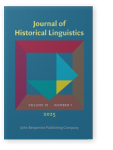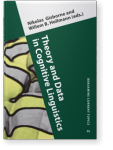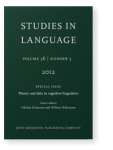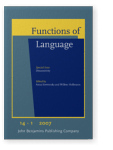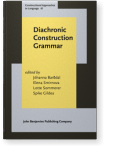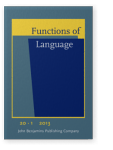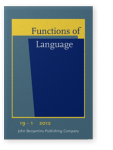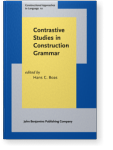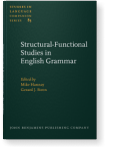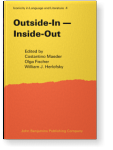Willem B. Hollmann
List of John Benjamins publications for which Willem B. Hollmann plays a role.
Journal
Titles
Theory and Data in Cognitive Linguistics
Edited by Nikolas Gisborne and Willem B. Hollmann
[Benjamins Current Topics, 67] 2014. v, 262 pp.
Subjects Cognition and language | Cognitive linguistics | Historical linguistics | Theoretical linguistics
Theory and data in cognitive linguistics
Edited by Nikolas Gisborne and Willem B. Hollmann
Special issue of Studies in Language 36:3 (2012) v, 258 pp.
Subjects Functional linguistics | Theoretical linguistics | Typology
Ditransitivity
Edited by Anna Siewierska and Willem B. Hollmann
Special issue of Functions of Language 14:1 (2007) vi, 173 pp.
Subjects Functional linguistics | Pragmatics | Theoretical linguistics
2015 In memory of Anna Siewierska Diachronic Construction Grammar, Barðdal, Jóhanna, Elena Smirnova, Lotte Sommerer and Spike Gildea (eds.), pp. ix–xii | Article
2014 Theory and data in cognitive linguistics Theory and Data in Cognitive Linguistics, Gisborne, Nikolas and Willem B. Hollmann (eds.), pp. 1–14 | Article
2014 Word classes: Towards a more comprehensive usage-based account Theory and Data in Cognitive Linguistics, Gisborne, Nikolas and Willem B. Hollmann (eds.), pp. 211–238 | Article
Structuralists and generativists define word classes distributionally (Palmer 1971, Baker 2003, Aarts 2007), while cognitive linguists take a semantic (Langacker 1987a) or semantic-pragmatic approach (Croft 1991, 2001). Psycholinguistic research, by contrast, has shown that phonological properties… read more
2013 Sources of BET Functions of Language 20:1, pp. 90–124 | Article
We investigate the sources of betting constructions, and specifically their predicates. The notion of risking something of value on an outcome is a complex one. Culturally, some degree of disposability of property is required. The concept is nevertheless lexicalized in many parts of the world.… read more
2012 Tributes and obituary Functions of Language 19:1, pp. 1–3 | Article
2012 Theory and data in cognitive linguistics Theory and data in cognitive linguistics, Gisborne, Nikolas and Willem B. Hollmann (eds.), pp. 463–476 | Article
2012 Word classes: Towards a more comprehensive usage-based account Theory and data in cognitive linguistics, Gisborne, Nikolas and Willem B. Hollmann (eds.), pp. 671–698 | Article
Structuralists and generativists define word classes distributionally (Palmer 1971, Baker 2003, Aarts 2007), while cognitive linguists take a semantic (Langacker 1987a) or semantic-pragmatic approach (Croft 1991, 2001). Psycholinguistic research, by contrast, has shown that phonological properties… read more
2010 Revising Talmy’s typological classification of complex event constructions Contrastive Studies in Construction Grammar, Boas, Hans C. (ed.), pp. 201–236 | Article
2007 From language-specific constraints to implicational universals: A cognitive-typological view of the dative alternation Ditransitivity, Siewierska, Anna and Willem B. Hollmann (eds.), pp. 57–78 | Article
This article seeks to shed more light on the well-studied, yet still challenging, dative alternation. It starts from the cognitive-typological suggestion of Croft (2001, 2003) that language-internal variation is subject to the same constraints as cross-linguistic variation (the semantic map model),… read more
2007 Ditransitive clauses in English with special reference to Lancashire dialect Structural-Functional Studies in English Grammar: In honour of Lachlan Mackenzie, Hannay, Mike and Gerard J. Steen (eds.), pp. 83–102 | Article
Unlike many other languages, English has three ditransitive constructions; a prepositional one in which the recipient or beneficiary is marked by a preposition and two double object constructions, one in which the recipient precedes the theme and the other in which the theme precedes the recipient.… read more
2007 Introduction Ditransitivity, Siewierska, Anna and Willem B. Hollmann (eds.), pp. 1–7 | Article
2005 The iconicity of infinitival complementation in Present-day English causatives Outside-In — Inside-Out, Maeder, Costantino, Olga Fischer and William J. Herlofsky (eds.), pp. 287–306 | Article
